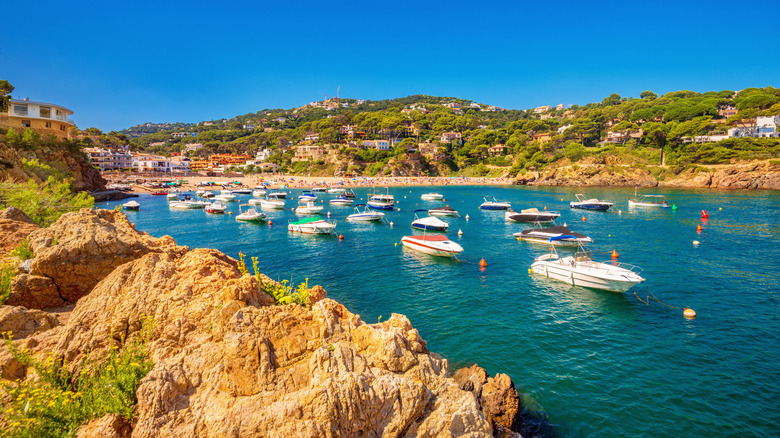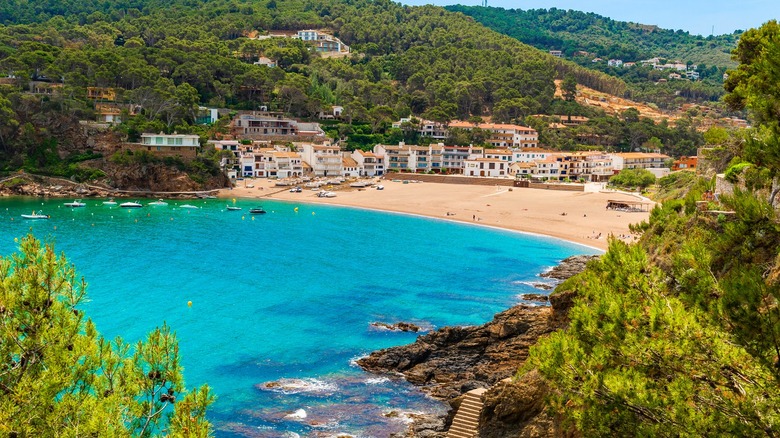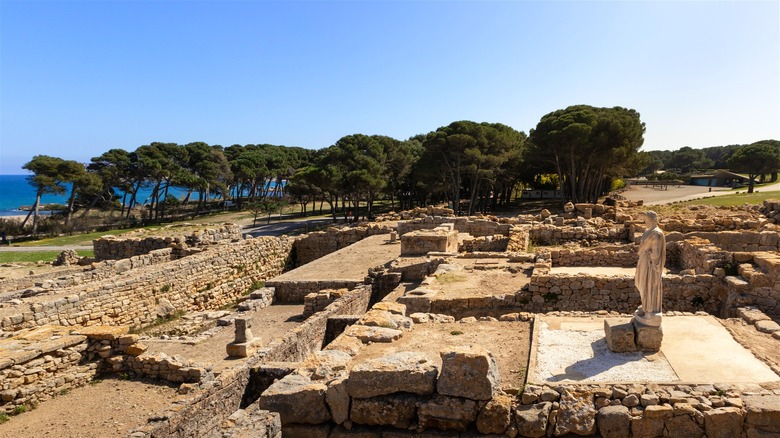Locals Love This Spanish Beach Gem Packed With History And Crystal Clear Water
Spain beckons visitors with its historic cities, vibrant culture, and tasty cuisine, not to mention hundreds of miles of stunning coastline. While many flock to the shores of Spain's Costa del Sol for beach bum bliss, you don't want to miss out on Sa Riera, a hidden gem on the Costa Brava with crystalline waters and history galore. The Costa Brava is a region in Spain's northeastern autonomous community of Catalonia. This idyllic coastal area is found north of Barcelona and extends to the French border. The area is characterized by its striking, rugged coastline, which offers views of white-washed cities, sparkling sea coves, rich history, and a delightful Mediterranean climate.
Of Costa Brava's many beaches, Sa Riera is a glittering Mediterranean jewel, complete with golden sand and turquoise waters. This stunning cove is 1.7 miles from Begur, a town just a few hours outside Barcelona with charming historic streets and medieval buildings. Not far from Sa Riera are two cultural powerhouses that make perfect day trips to boost your holiday: the wild and wacky Dalí Theatre Museum and the ancient Ruins of Empúries. Pack a swimsuit and a guidebook with the most important Spanish phrases tourists should know for a vacation to Spain, and get ready to explore one of the Costa Brava's most tantalizing regions.
Swim, snorkel, and snack at Sa Riera
As a crescent of golden sand with the texture of sugar, Sa Riera is the perfect spot to spread out a towel and relax for the afternoon. The beach is named for the small stream that slices it in two — the right side bears moored sailboats, while the left side is open for beach-goers. The cove is hugged by rocky cliffs with white houses peeking out from the dense Mediterranean vegetation. Go for a dip in the refreshing aquamarine waters, or grab a mask and fins to snorkel along the rocky bay. Dive enthusiasts should check out Sa Barraca Waterhouse, a certified diving center offering courses and diving trips around the Sa Riera area. Swim through schools of fish or explore the bottom of the sea under the guidance of excellent instructors.
If you've worked up an appetite after your snorkel or dive session, head over to Recer de la Mar for elegant dining and attentive service. The restaurant's cuisine is Mediterranean with a twist, with Spanish classics, like ham croquettes, and exploratory dishes, like handmade Monkfish ravioli and spicy prawn dim sum. If you need a snack but can't be bothered to leave the beach, the seaside La Gandula has you covered, serving food and drinks right on Sa Riera. Enjoy a ration of patatas bravas (potatoes with a smoky sauce) and an ice-cold Spanish beer while gazing out over the sparkling Mediterranean. In addition to a beach bar, Sa Riera's amenities include showers, toilets, and lifeguards during the summer, creating a pleasant experience at this Costa Brava gem.
Day trips from Sa Riera
Venture beyond the beach to enjoy the cultural richness of this coastline. Art lovers can't miss the Dalí Triangle, three interconnected museums dedicated to the mustachioed Spanish surrealist painter Salvador Dalí. The most popular of the three is the Dalí Theater-Museum, just over 30 miles from Sa Riera in the town of Figueres. The hot pink facade is adorned with large egg sculptures and a massive glass globe, being crowned as "the world's largest Surrealist object." Once a former theater, Dalí reimagined this space as a testament to his artistic career and donated the museum to his hometown of Figueres. Venture inside for an immersive, multi-faceted experience, as the eccentric world of Dalí is portrayed through his sculptures, paintings, photography, and even holograms.
The Ruins of Empúries are another must-see along the Costa Brava, a testament to the millennia of history along this coastline. Just a 40-minute drive from Sa Riera, these Greco-Roman ruins will transport visitors back in time. The area around the seaside town of Sant Martí d'Empúries was once used as a Greek trading post before the Roman conquest of the Iberian Peninsula. Visitors can tour the ancient ruins, walking past defensive walls, a center dedicated to the Greek god of medicine, Roman public baths, a forum, and striking black and white mosaics. Instead of heading back to Barcelona once you're done, visit Valencia for spacious beaches and excellent restaurants.


